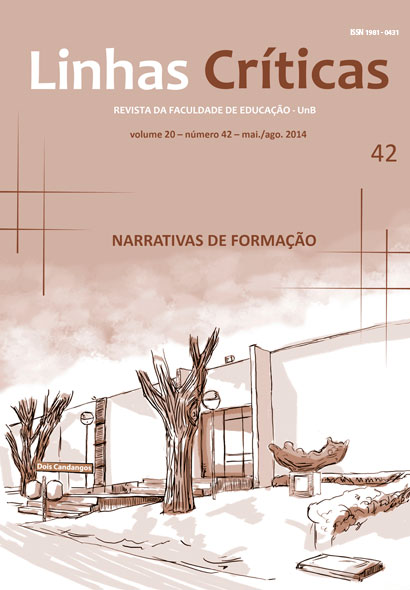Reading as training, training as reading: narrative/formative processes in question
DOI:
https://doi.org/10.26512/lc.v20i42.4310Keywords:
Narratives;, Teacher training;, ReadingAbstract
This article presents research conducted with teachers form the public school system in the Brazilian Federal District and teachers who majored in education in Rio de Janeiro. The idea was to reveal interpretations and narratives of their experiences while in training. In this perspective, we attempted to think about the objects’ perceptions around their reading experiences throughout their school history, as well as comprehend the existence of a dialog between these experiences and their current educational practices. We concluded that narrative showed itself as an important space for the establishment of new possibilities of interpreting the relations between school memories related to reading and matters related to professional practice.
Downloads
References
ALARCÃO, Isabel (Org.). Formação reflexiva de professores: estratégias de supervisão. Porto: Porto Editora, 1996.
BENJAMIN, Walter. Obras escolhidas I: Magia e Técnica, Arte e Política. São Paulo, Brasiliense, 1985.
BRAGANÇA, Inês Ferreira Souza. O/a professor/a e os espelhos da pesquisa educacional. Revista Brasileira Estudos Pedagógicos, Brasília, v. 90, n. 224, p. 87-101, jan./abr. 2009.
CLANDININ, Jean.; CONNELLY, Michael. Narrative and story in practice and research. In: SCHÖN, Donald. (Ed) The reflective turn: Case studies in and on educational practice. New York: Teachers College Press, 1991, p. 258-281.
CONNELLY, Michael; CLANDININ, Jean. On narrative method, personal philosophy, and narrative unities in the story of teaching. Journal of Research in Science Teaching, New York, v. 23, n. 4, p. 293-310, 1986.
GALVÃO, Cecília. Narrativas em Educação. Ciênc. educ. (Bauru), Bauru, v. 11, n. 2, ago. 2005. Disponível em http://www.scielo.br/scielo.php?script=sci_arttext&pid=S1516-73132005000200013&lng=pt&nrm=iso Acesso em: mar. de 2012.
LARROSA, Jorge. Notas sobre a experiência e o saber de experiência. Revista Brasileira de Educação, Rio de Janeiro, n.19, abr. 2002. Disponível em http://www.anped.org.br/rbe/rbedigital/RBDE19/RBDE19_04_JORGE_LARROSA_BONDIA.pdf Acesso em março de 2011.
LARROSA, Jorge. Literatura, experiência e formação: uma entrevista com Jorge Larrosa. In: Costa, M. V. (Org.). Caminhos investigativos: novos olhares na pesquisa em educação. Porto Alegre: Mediação, 1996, p.133-161.
SCHÖN, Donald. Formar professores como profissionais reflexivos. In: NÓVOA Antonio (Org.). Os professores e sua formação. Lisboa: Dom Quixote, 1992.
VYGOTSKY, Lev Seminovich. Pensamento e linguagem. São Paulo: Martins Fontes, 2005.
VYGOTSKY, Lev Seminovich. Psicologia pedagógica. São Paulo: Martins Fontes, 2001.
VYGOTSKY, Lev Seminovich. A tragédia de Hamlet, príncipe da Dinamarca. São Paulo: Martins Fontes, 1999.
YUNES, Eliana. Introdução: Leitura, a complexidade do simples: do mundo à letra e de volta ao mundo. In.: Pensar a leitura: complexidade. YUNES, Eliana. (Org.). Rio de Janeiro: Ed. PUC-Rio. São Paulo: Loyola, 2005, p.13-51.
YUNES, Eliana. Elementos para uma história de interpretação. In.: Pensar a leitura: complexidade.
YUNES, Eliana. (Org.). Rio de Janeiro: Ed. PUC-Rio. São Paulo: Loyola, 2005 p.97-103.
Downloads
Published
How to Cite
Issue
Section
License
Copyright (c) 2016 Linhas Críticas

This work is licensed under a Creative Commons Attribution 4.0 International License.
Authors who publish in this journal agree to the following terms:
-Authors maintains the copyright and grants the journal the right of first publication, the work being simultaneously licensed under the Creative Commons Attribution License which allows the sharing of the work with recognition of the authorship of the work and initial publication in this journal.
- Authors are authorized to enter into additional contracts separately, for non-exclusive distribution of the version of the work published in this journal (eg publish in institutional repository or as a book chapter), with acknowledgment of authorship and initial publication in this journal.
-Authorers are allowed and encouraged to publish and distribute their work online (eg in institutional repositories or on their personal page) at any point before or during the editorial process, as this can generate productive changes as well as increase the impact and the citation of published work (See The Effect of Free Access).



